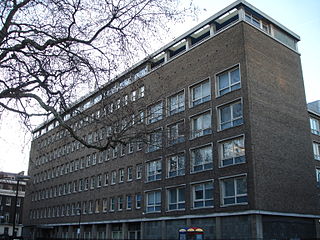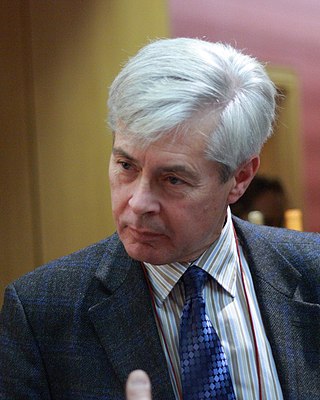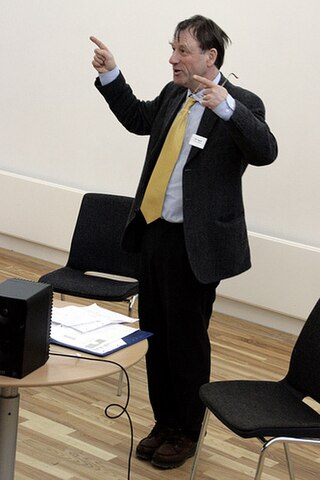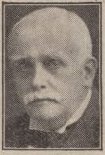
Darwinism is a term used to describe a theory of biological evolution developed by the English naturalist Charles Darwin (1809–1882) and others. The theory states that all species of organisms arise and develop through the natural selection of small, inherited variations that increase the individual's ability to compete, survive, and reproduce. Also called Darwinian theory, it originally included the broad concepts of transmutation of species or of evolution which gained general scientific acceptance after Darwin published On the Origin of Species in 1859, including concepts which predated Darwin's theories. English biologist Thomas Henry Huxley coined the term Darwinism in April 1860.

Andrew Colin Renfrew, Baron Renfrew of Kaimsthorn, was a British archaeologist, paleolinguist and Conservative peer noted for his work on radiocarbon dating, the prehistory of languages, archaeogenetics, neuroarchaeology, and the prevention of looting at archaeological sites.

Sir Julian Sorell Huxley was an English evolutionary biologist, eugenicist, and internationalist. He was a proponent of natural selection, and a leading figure in the mid-twentieth century modern synthesis. He was secretary of the Zoological Society of London (1935–1942), the first director of UNESCO, a founding member of the World Wildlife Fund, the president of the British Eugenics Society (1959–1962), and the first president of the British Humanist Association.

Peter John Ucko FRAI FSA was an influential English archaeologist. He served as Director of the Institute of Archaeology at University College London (UCL), and was a Fellow of both the Royal Anthropological Institute and the Society of Antiquaries. A controversial and divisive figure within archaeology, his life's work focused on eroding western dominance by broadening archaeological participation to developing countries and indigenous communities.

Robin Ian MacDonald Dunbar is a British biological anthropologist, evolutionary psychologist, and specialist in primate behaviour. Dunbar is professor emeritus of evolutionary psychology of the Social and Evolutionary Neuroscience Research Group in the Department of Experimental Psychology at the University of Oxford. He is best known for formulating Dunbar's number, a measurement of the "cognitive limit to the number of individuals with whom any one person can maintain stable relationships".

Conrad Hal Waddington was a British developmental biologist, paleontologist, geneticist, embryologist and philosopher who laid the foundations for systems biology, epigenetics, and evolutionary developmental biology.

UCL's Institute of Archaeology is an academic department of the Social & Historical Sciences Faculty of University College London (UCL) which it joined in 1986 having previously been a school of the University of London. It is currently one of the largest centres for the study of archaeology, cultural heritage and museum studies in the world, with over 100 members of staff and 600 students housed in a 1950s building on the north side of Gordon Square in the Bloomsbury area of Central London.

Walter Frank Raphael Weldon FRS, was an English evolutionary biologist and a founder of biometry. He was the joint founding editor of Biometrika, with Francis Galton and Karl Pearson.

Peter J. Bowler is a historian of biology who has written extensively on the history of evolutionary thought, the history of the environmental sciences, and on the history of genetics. His 1984 book, Evolution: The History of an Idea is a standard textbook on the history of evolution; a 25th anniversary edition came in 2009. His 1983 book The Eclipse of Darwinism: Anti-Darwinian Evolution Theories in the Decades Around 1900 describes the scientific predominance of other evolutionary theories which led many to minimise the significance of natural selection, in the first part of the twentieth century before genetics was reconciled with natural selection in the modern synthesis.

Sir Gavin Rylands de Beer was a British evolutionary embryologist, known for his work on heterochrony as recorded in his 1930 book Embryos and Ancestors. He was director of the Natural History Museum, London, president of the Linnean Society of London, and a winner of the Royal Society's Darwin Medal for his studies on evolution.
Steven Mithen, is an archaeologist. He is noted for his work on the evolution of language, music and intelligence, prehistoric hunter-gatherers, and the origins of farming. He is professor of early prehistory at the University of Reading.

Timothy Ingold is a British anthropologist, and Chair of Social Anthropology at the University of Aberdeen.
Sir Paul Anthony Mellars was a British archaeologist and professor of prehistory and human evolution at the University of Cambridge.
Joe Cain is a historian of science who specialises in the history of evolutionary biology. He is currently Professor of History and Philosophy of Biology at University College London, and from 2011 to 2019 he was Head of Department of UCL's Department of Science and Technology Studies. He was also editor of BSHS Monographs, a series published by the British Society for the History of Science.

Robert H. Layton is a British anthropologist and Fellow of the British Academy. He is Emeritus Professor of Anthropology at Durham University. He has carried out fieldwork in rural France and in a number of Aboriginal communities in Australia, and recently on traditional craft in rural China. Robert Layton studied anthropology at University College London under the famous Australian anthropologist Phyllis Kaberry. He completed his DPhil under the supervision of F.G. Bailey at the University of Sussex. He is known for his eclectic approach to anthropology and diverse range of interests. He has written extensively about art, archaeology, the evolution of hunter-gatherer society and culture, the co-evolution of genes and culture, social change and anthropological theory. He was the recipient of the Royal Anthropological Institute's Rivers Memorial Medal for a substantive contribution to anthropology in 2003

Ernest William MacBride FRS was a British/Irish marine biologist, one of the last supporters of Lamarckian evolution.
Bryan Thomas Grenfell is a British population biologist and the Kathryn Briger and Sarah Fenton Professor of Ecology and Evolutionary Biology and Public Affairs at the Princeton School of Public and International Affairs at Princeton University.
There are two main approaches currently used to analyze archaeological remains from an evolutionary perspective: evolutionary archaeology and behavioral ecology. The former assumes that cultural change observed in the archaeological record can be best explained by the direct action of natural selection and other Darwinian processes on heritable variation in artifacts and behavior. The latter assumes that cultural and behavioral change results from phenotypic adaptations to varying social and ecological environments.
Ruth Mace FBA is a British anthropologist, biologist, and academic. She specialises in the evolutionary ecology of human demography and life history, and phylogenetic approaches to culture and language evolution. Since 2004, she has been Professor of Evolutionary Anthropology at University College London.
Henry Charles Plotkin was a British evolutionary psychologist who applied Darwinian principles to the understanding of the mind, behavior, culture and knowledge.












